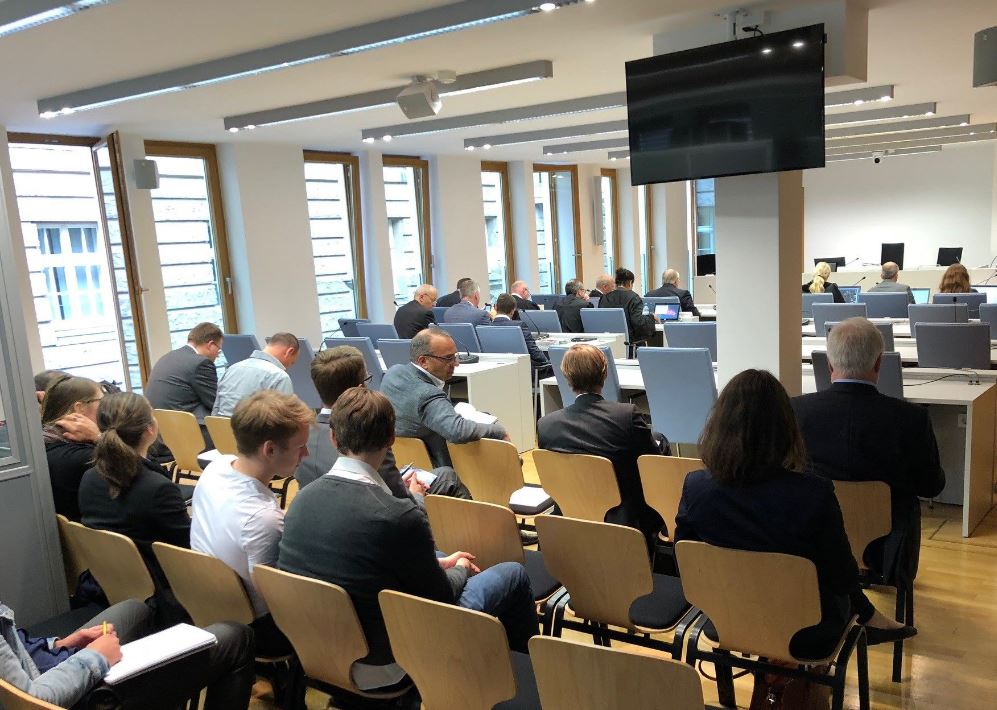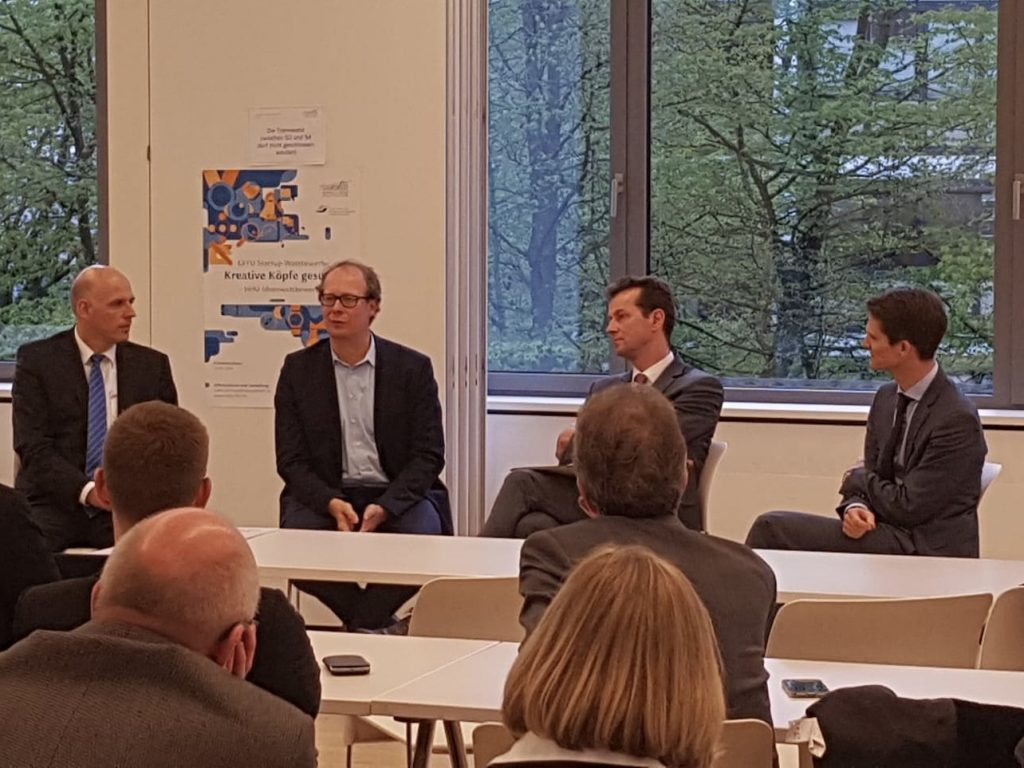
SSNIPpets (26): Onboarding
When things come to a head, there is only one thing left for your correspondent to do: keep calm and carry on. And so, at the end of an exciting competition week, Rupprecht Podszun brings everything back into his very own chaotic order. Here are his SSNIPpets – small but significant news, information and pleasantries – our pet project!
Sie können diesen Text auch in Deutsch lesen – ändern Sie einfach die Sprache!
Get in, please!
While I am sitting in an otherworldly room, scratching these SSNIPpets onto paper with a pen, a servant ghost pushes an envelope through my doorway: “Innovation cartel” is written on it. So there it is, the Statement of Objections against Daimler, BMW and VW, which – so the accusation goes – withheld innovations in emissions technology from consumers. Instead of competing for the best ecological solution, the parties colluded. The European Commission’s press release reads as if Margrethe Vestager was determined to impose a fine for an innovation cartel at the end of her term of office. That would be quite new, but it would fit into a pattern: Innovation was also a key issue in the Dow/Dupont and Bayer/Monsanto merger cases. In the discussion about digital competition (see below), the hope for disruptive innovations is for some the straw to which to cling. If there were a legally binding decision against the car manufacturers, this would be new ammunition for plaintiffs seeking damages in follow-on-claims. Economists will probably find out, once we put them into the hot tub, what the damage is when the introduction of new technology is delayed or omitted. For Vestager, a blow against Daimler, VW and BMW is another showing of her impartiality.
Take out your notebooks!
René Descartes (who is something like the patron saint of this blog and the father of modern philosophy) one day began to ask himself what is actually a dream, what is being awake, and whether he is not constantly deceived. The next day he noted:
“Yesterday’s reflection plunged me into such powerful doubts that I can’t get rid of them anymore; and yet I see no way to solve them! It seems to me as if I had suddenly fallen into a deep pond and was swirling around in such a way that I could not set foot on the ground, but I could not swim up to the surface either”.
The antitrust events of these days had quite some swirl and for me, they coincided with the “onboarding” of the next generation of antitrust lawyers in my course at university. These young minds had courageously decided to join the sect of competition lawyers. What’s new this semester is that almost all students had opened their Macbooks, which was different in the good old days the past semesters, when I looked mainly at faces, not at glowing Apple logos. (By the way, this is an ambivalent pleasure for lecturers who strive for interaction. When I ask, for example, “What is a market?” – I sometimes can’t get rid of the suspicion that an answer from Wikipedia is paraphrased when looking at the screen. But then my research assistants always reassure me: According to their findings, the students don’t look up the answers to my questions on their laptops, but follow NBA basketball games).
In any case, I told these hopeful young digitalists that there hadn’t been similarly exciting times for business lawyers in a long time, and exactly the same words were used in the evening, four hours later, by the Bundeskartellamt’s Jörg Nothdurft at a forum at Heinrich Heine University (I’ll tell you later about that).

A frenzy in the beer cartel
What a bang: On Wednesday, the Düsseldorf Higher Regional Court (Oberlandesgericht) cleared the beer cartel in a somewhat surprising move. For those of you who follow the intricacies of German cartel fining, you may remember that only one brewery, Carlsberg, was left defending itself against a Bundeskartellamt fine. The other appeals had been withdrawn, not least out of concern that the fine could get worse at the Higher Regional Court. Carlsberg had this prospect, too: The Bundeskartellamt had imposed a fine of 62 million euros; the public prosecutors, who take over proceedings at court level, had proposed a fine of 250 million euros to the bench. If the Court had followed the public prosecutors in this much-regarded procedure, this would perhaps have been the coffin nail for appealing to the Court. This, in turn, would have meant that the Bundeskartellamt would de facto no longer be subject to judicial review in cases of fines. Konrad Ost and Ludger Breuer, two staff members of the Bundeskartellamt, had recently tried to show that the picture is mixed, and that the court does not always set higher fines. In vain: Probably, it is hard to convince managers with footnotes in scholarly papers if there is a figure six times higher than what you had at the Bundeskartellamt level in the official order handed down by the appeals tribunal (for the same conduct!) This happened in the past.
Jürgen Wessing, a criminal defence lawyer who is exactly the way I always imagine a criminal defence lawyer to be, served as counsel to the brewery. He gave an interview with German weekly Wirtschaftswoche. Managers should not read that – it is not for the faint-hearted. According to Wessing, it is not follow-on damage claims that are the worst to come from white-collar crime, but – besides being raped in the prison shower – the divorce of your marriage that happens.
Before drifting into family law: The Senate of the Düsseldorf Higher Regional Court, chaired by Manfred Winterscheidt, “enriched” the embedded observers of the beer cartel with a new variant: The participation in the exchange of information at issue here is time-barred. 0 Euro fine.
Ministerial approval out of control
The beer cartel took its turn at a time when I was still thinking about a message from last week: there is a new application for ministerial approval. Maximilian Konrad had reported about it here in the blog. It always ends in shambles when a politician tries to serve as a competition authority, trying to apply a public goods standard to a merger case. To be on the safe side, the legislature limited the right to judicial review in such cases with the effect that Miba/Zollern will most probably go without judicial review (in case the Minister overrules the Bundeskartellamt). Someone joked that with the new rule on judicial (non-)review in place the Minister could simply wave through the merger on half a page, without any formalities. Parliament would have to exercise its control over the Minister and, if necessary, question him on the case. I hope – for the time being – that it simply does not happen. If you want a juicy read how not to grant a ministerial authorisation, please turn to the decision of the Düsseldorf Higher Regional Court on Edeka/Kaiser’s Tengelmann!
When I had “shared” the blog post on Miba/Zollern on LinkedIn, a foreign colleague asked me whether the abolition of the right to appeal for third parties against the authorisation in Germany had not led to “opposition, strong criticism”. Well, somehow we did not succeed in taking young people to the streets for a “F*** § 63” uproar (as happened in Germany with Article 13 of the copyright directive). I will try to get my new students into that revolutionary mood for the next anti-competitive act. Promised.
Facebook – the full story
Let’s turn to Facebook. The Bundeskartellamt published its decision, 309 pages long (in German), 5 pages make the detailed order of what exactly is to be done. Maybe, this is the most spectacular decision ever taken by the Bundeskartellamt.
One thing for the more distinguished gourmets of procedural law is in No. 5 of the decision:
“The deadlines for implementation set out in Sections 3.a. to 3.c. are suspended and are extended once by 2 months, provided that a request for an order for suspensive effect of the appeal pursuant to Section 65 (3) sentence 3 ARC is filed within a period of 2 (two) months after notification of the decision. The suspension begins with the receipt of the application at the court of appeal and ends with the termination of the summary proceedings at first instance on this application.”
Such a standstill clause may be common practice, but according to my memory it is very unusual to place that into the decision itself. It takes some of the incentive away from the company concerned to press ahead with the summary proceedings. Yet, the Bundeskartellamt makes clear in the Facebook decision that it may suspend the suspension during the suspension proceedings by means of revocation. The three signatories of the decision (Topel, Judith, Sewczyk – remember that in Germany it is an independent panel of three deciding the case) indicate that this may become relevant if the proceedings take a little longer than usual, e.g. because the Higher Regional Court makes a referral to the European Court of Justice. This would be possible. Overall, an early referral would presumably speed up the overall clarification of the case.
While the Bundeskartellamt is trying to make the “internal divestiture” legally binding, i.e. the separation of data from Facebook, Instagram and WhatsApp, Facebook is allegedly working on merging its three core messenger services. (I’m saving some time here by not alluding deridingly to the merger control in Facebook/WhatsApp…) My former boss at the Bundeskartellamt (when I was still a case handler) taught me one lesson for merger control law: “Once you make scrambled eggs you will never be able to break it up into to two eggs again.”
And for the friends of privacy
Some people criticised that the Bundeskartellamt in Facebook interpreted data protection laws beyond its competence. This is dealt with under recitals 535-558 in the decision. In this regard, I find interesting what I read in “Privacy in Germany” as a summary of a survey among German data protection authorities:
“The data protection supervisory authorities of the Länder are about to implode under the burden of complaints, reports and requests for advice. For years they have been chronically understaffed, with the introduction of the General Data Protection Regulation working conditions have drastically deteriorated again since May 2018.”
Anyone who wants to effectively enforce laws against large companies needs the resources and experience of an authority such as the Bundeskartellamt. Of course, this applies not only to data protection, but also to consumer protection.
ABA, Steinberg and the Special Advisers
Among the highlights in this blog for me were the two posts this week. May I guide your attention to the two again? Nine colleagues wrote down their impressions of the ABA Antitrust Spring Meeting (and we tried to make this nonet play well together, the technical result was so-so – so-so-sorry, again). In many of the contributions the transatlantic rift was a topic, this San Andreas Fault of antitrust law: Europe with a tough approach against the powerhouses of the digital era here, the U.S. there, where problems are increasingly seen, but not yet tackled.
Philipp Steinberg, the director general of the Federal Ministry of Economics and Technology in Germany, who is responsible for competition policy, among other things, wrote for D’Kart, too. Steinberg wants us, i.e. the competition community, get involved discussing what a “National Industrial Strategy” could look like, instead of holing up on our competition law island fighting off whatever may be washed up.
The Special Advisers’ report is out! The Commission published it yesterday.
Jacques Crémer, Yves-Alexandre de Montjoye and Heike Schweitzer worked on “competition policy for the digital era”, as instructed by Commissioner Vestager. This was preceded by a study on German abuse law (where Schweitzer was involved, too) and a conference in Brussels with a remarkable pro-enforcement stance. I have not yet read everything, but at least I read the Executive Summary. I simply find it good and exciting that the analysis of platform markets does not begin with network effects or data power or algorithms, but with “extreme returns to scale”. It should also be groundbreaking to bring a new quality of platform businesses to the point: “platforms as regulators”. Platforms set their own rules:
“A dominant platform that sets up a marketplace must ensure a level playing field on this marketplace and must not use its rule-setting power to determine the outcome of the competition.”
I could imagine a couple of abuse cases following from this “special responsibility”.
It is also noteworthy that, contrary to general expectation, the authors are opposed to a new threshold in merger control, based on the German model of transaction-value. Instead, the substantive test may be stricter, especially in the case of conglomerate mergers.

A lesson in history
All that happened yesterday, and it was a coincidence that in the evening we had a discussion with economist Justus Haucap and Jörg Nothdurft, the head of the Bundeskartellamt’s legal service, at my Heinrich Heine University in Düsseldorf. Both are well known in Germany (and beyond), not least for being very entertaining. Justus Haucap presented the study, which he had co-written with Heike Schweitzer, Wolfgang Kerber and Robert Welker some time ago. We had asked Jörg Nothdurft to comment from the point of view of the competition agency.
Now this was difficult, obviously. You cannot just present your authority’s wish list in public if the Ministry that formally oversees your work is currently working on it. Also, you do not want to speak about on-going cases with some of the judges present in the room. Nothdurft, however, who regularly represents the Bundeskartellamt in Supreme Court hearings is made from sterner stuff, and he skilfully picked up the words of Haucap. He became very fundamental in what he said, and I found that very remarkable. As the head of legal service and litigation, he is deeply entrenched in the existing law and in mainstream doctrine. Nothdurft is not one for the more airy topics. So what did he do? He went back to history and looked at the roots of antitrust law. At first sight, this had little to do with platform economics, or with shaping the digital future. He sent a simple message: It was not so much the concern about stifling economic competition that drove John Sherman and Theodore Roosevelt when they created antitrust law. It was unrestrained power that made them shudder.
Have a nice weekend!
2 thoughts on “SSNIPpets (26): Onboarding”
Zum “Emissionskartell” der von Daimler, BMW und VW: Das Kartellrecht muss zunehmend auf fremden Baustellen aushelfen. Sei es Libor (Bankenregulierung ), Facebook (Datenschutz) oder nun das Emissionskartell (Umweltrecht). Immer wenn der politisch Wille stark und das einschlägige Regulierungsrecht schwach ist, muss das Kartellrecht einspringen. Und auf der eigenen Baustelle steht das Wasser schon mannshoch in der Grube. Davon berichtet z.B. die Sektoruntersuchung E-Commerce, nach der fast die Hälfte der Online-Händler Preisbeschränkungen unterliegen. Dem steht gerade mal eine Handvoll Bußgeldverfahren in diesem Bereich gegenüber – der berühmte Tropfen auf den heißen Stein…